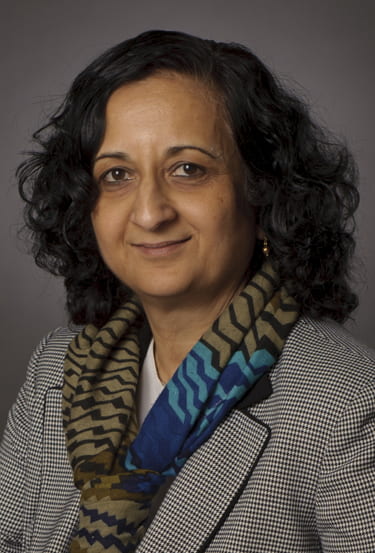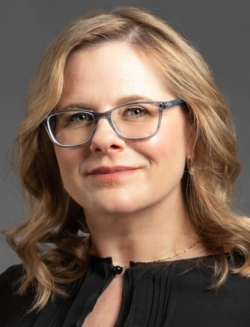Keynote Speakers

Dr. Anuradha Annaswamy, MIT
9:30 AM - 10:30 AM, Thursday Jan 29
Founder and Director, Active-Adaptive Control Laboratory
MIT
Abstract: The Interplay Between Adaptation, Learning, and Safety in High Performance Systems
Autonomous functioning via real-time monitoring and information management is an attractive ingredient in the design of any high-performance system. High-performance systems require design tools that not only deliver the requisite performance, but are able to function amidst various uncertainties, and are stable, safe, robust, resilient, and optimal. Uncertainties could be present due to various reasons including malfunctions, environmental variations, ageing, and modeling errors. Safety considerations often lead to constraints on states and outputs, introducing limitations that prevent against catastrophic events or damages that could lead to irrecoverable failure modes, and ensuring secure and resilient behavior. Stability, robustness, and optimality, the mainstays of feedback control systems, are necessary properties for any autonomous system. Adaptation together with learning are control methodologies that have been employed in order to achieve these properties as well as safety in the face of uncertainties. This talk will focus on the interplay between adaptation, learning, and safety while designing high-performance autonomous systems using feedback control.
The field of adaptive control has excelled at real-time control of systems with specific model structures through adaptive rules that learn the underlying parameters while providing strict analytical guarantees. These guarantees pertain to stability and robustness in the face of imperfect learning, and guarantees of optimality when parameter learning is feasible. The interplay between adaptation and learning has been explored at length over the years when no constraints are imposed on the input magnitude or on the states. This interplay becomes more complex when considerations of safety enter the picture, as the control inputs that are required to filter out unsafe control inputs even while adapting to the uncertain parameters may compromise performance considerations. A requisite adaptive control input that guarantees the desired performance may not always meet safety constraints. While an appropriate tradeoff between performance and safety may be realizable for a nominal system, the introduction of uncertainties makes it difficult to understand when and how the tradeoffs are realized. Thus, the central question that this talk is focused around is this: how can we leverage adaptation and parameter learning to ensure safety with minimal conservatism?
This talk will examine the interplay between adaptive control and safety. On the safety side, we will explore ways of integrating design principles from the fields of adaptive control and control barrier functions. We will then show how this integration leads to a controller which guarantees safety under parametric uncertainties, with conservatism that vanishes to near-zero with no requirements on excitation. The impact of learning on this interplay will also be examined, with a focus on achieving optimal performance when parameter learning is enabled. How reinforcement learning methods can be integrated into the overall control design will be explored as well, so that near-optimal policies can be realized for highly complex control tasks. Examples from flight control will be utilized to illustrate all of the above concepts and challenges.
Dr. Anuradha Annaswamy is Founder and Director of the Active-Adaptive Control Laboratory in the Department of Mechanical Engineering at MIT. Her research interests span adaptive control theory and its applications to aerospace, automotive, propulsion, and energy systems as well as cyber physical systems such as Smart Grids, Smart Cities, and Smart Infrastructures. She has received best paper awards (Axelby, 1986; CSM, 2010), as well as Distinguished Member and Distinguished Lecturer awards from the IEEE Control Systems Society (CSS), best paper award from the IFAC journal Annual Reviews in Control for 2021-23, and a Presidential Young Investigator award from NSF, 1991-97. She is a Fellow of IEEE and International Federation of Automatic Control. She is the recipient of the Distinguished Alumni award from Indian Institute of Science. She received the IEEE Control Systems Technology Award from CSS in 2024.

Dr. Andreas Malikopoulos, Cornell
9:30 AM - 10:30 AM, Friday Jan 30
Professor, Cornell University
Abstract: Autonomous Teams: Where Learning Meets Control
At the frontier of autonomy lies a fundamental question: how can we design teams of agents that reason, act, learn, and memorize cooperatively in dynamic, uncertain environments? In this talk, I will present a unified perspective that integrates learning and control as the foundational principles for building such autonomous teams. In the first half of the talk, I will discuss how my group has advanced the ability of engineered systems to reason and act optimally under uncertainty, and to learn adaptively from interactions with their environment. I will illustrate these ideas through transportation-related applications, including self-learning powertrain control, power management of hybrid electric vehicles, and optimal coordination of connected and automated vehicles. These examples highlight how data-driven control and reinforcement learning can enable autonomous systems to operate safely and efficiently in real time while achieving near-optimal performance. The second half of the talk will focus on the next frontier—building autonomous teams. I will present a theoretical framework grounded in team theory, a mathematical formalism for decentralized stochastic control problems in which multiple agents with asymmetric information cooperate toward a shared objective. I will discuss recent structural results for sequential dynamic team problems with nonclassical information structures, showing how to construct information states that remain invariant to control strategies, thereby enabling dynamic programming decompositions in decentralized settings. These results can aim toward a unifying scientific foundation—what I refer to as the Science of Autonomous Team Intelligence—where teams of agents, whether robotic, vehicular, or human–machine, can reason, act, learn, and memorize collectively, achieving coherent and safe behavior in complex, uncertain environments.
Dr. Andreas Malikopoulos is a Professor in the School of Civil & Environmental Engineering and the Director of the Information and Decision Science Lab at Cornell University. Prior to these appointments, he was the Terri Connor Kelly and John Kelly Career Development Professor in the Department of Mechanical Engineering (2017-2023) and the founding Director of the Sociotechnical Systems Center (2019-2023) at the University of Delaware (UD).
read more...
Before he joined UD, he was the Alvin M. Weinberg Fellow (2010-2017) in the Energy & Transportation Science Division at Oak Ridge National Laboratory (ORNL), the Deputy Director of the Urban Dynamics Institute (2014-2017) at ORNL, and a Senior Researcher in General Motors Global Research & Development (2008-2010). He received a Diploma from the National Technical University of Athens, Greece, and his M.S. and Ph.D. degrees from the University of Michigan, Ann Arbor, in 2004 and 2008, respectively, all in Mechanical Engineering. His research interests are grounded at the intersection of learning and control to enable systems—whether vehicles, robots, or large-scale infrastructures—to operate autonomously and achieve near-optimal performance while safely adapting to and interacting with dynamic environments. His work integrates decision-theoretic foundations with learning-based methods to endow engineered systems with the capability to reason, learn, and act in real time. Dr. Malikopoulos is the recipient of several prizes and awards, including the 2007 Dare to Dream Opportunity Grant from the University of Michigan Ross School of Business, the 2007 University of Michigan Teaching Fellow, the 2010 Alvin M. Weinberg Fellowship, the 2019 IEEE Intelligent Transportation Systems Young Researcher Award, and the 2020 UD’s College of Engineering Outstanding Junior Faculty Award. He has been selected by the National Academy of Engineering to participate in the 2010 German-American Frontiers of Engineering (FOE) Symposium and organize a session on transportation at the 2016 European-American FOE Symposium. He has also been selected as a 2012 Kavli Frontiers of Science Scholar by the National Academy of Sciences. Dr. Malikopoulos is an Associate Editor of Automatica and IEEE Transactions on Automatic Control, and a Senior Editor of IEEE Transactions on Intelligent Transportation Systems. He is a Senior Member of the IEEE, a Fellow of the ASME, and a member of the Board of Governors and Distinguished Lecturer of the IEEE Intelligent Transportation Systems Society.

Shelly Chaka, GM
2:00 PM - 2:30 PM, Friday Jan 30
Executive Director, Safety Assurance for Effective Autonomous Driving Software
GM
Shelly leads GM’s Safety Assurance for Effective Autonomous Digital Driving Software (SAFE-ADDS) in the Global Product Safety, Systems and Certification organization. Known for delivering major safety initiatives and innovative programs for autonomous vehicle tech companies including Cruise, Torc Robotics and Locomation, Shelly and her team are charged with championing and centralizing GM’s autonomous vehicle safety case, including safety metrics for evaluating system performance and driving continuous improvement.
read more...
During her 30-year career in various safety engineering and leadership positions, Shelly has garnered a wealth of experience in areas of automated driving systems and connected technologies, occupant protection, human factors, regulatory compliance, system engineering and validation. She has a solid engineering, product development and research foundation, having spent a significant amount of her career at Ford Motor Company and Virginia Tech Transportation Institute. She has a proven track record of major deliverables such as the creation of the Automated Mobility Partnership (AMP), bringing together numerous companies, leading program attribute leaders for multiple vehicle launches achieving NCAP 5-star and IIHS Top Safety Pick ratings, and cutting-edge research sponsored by US DOT, most notably 'A framework for Automated Driving System Testable Cases' and 'Removing Regulatory Barrier for Vehicles with Automated Driving Systems'. Shelly thrives in collaboration efforts that advance transportation safety for all road users and is committed to fostering a culture where real-world safety is valued as part of the success formula. It was this leadership and technical contribution to transportation safety that earned her the SAE International 2021 “J. Cordell Breed Award for Women Leaders.” Shelly holds a BS in Mechanical Engineering from Michigan State University and an MS in Automotive Engineering from the University of Michigan.